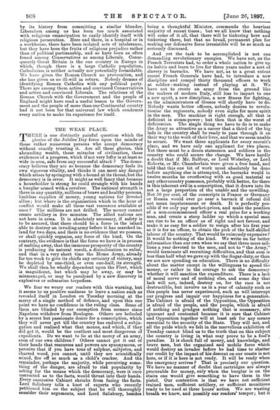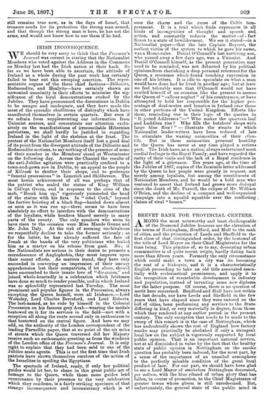THE WEAK PLACE. T HERE is one distinctly painful question which
the glories of the Jubilee Day force upon the minds of those rather numerous persons who accept democracy without exactly trusting it. Are all these glories, this abounding wealth, these miracles of civilisation, these evidences of a progress, which if not very lofty is at least so wide in area, safe from any successful attack ? The demo- cracy believes they are so because the democracy feels its own vigorous vitality, and thinks it can meet any danger which arises by springing with a bound at its throat, but the democracy is in error. It might as well fancy that because a householder is strong he could. strangle with his hands a burglar armed. with a revolver. The national strength is there in any quantity, millions of brave and healthy persons, limitless supplies of money, young nations for devoted allies ; but where is the organisation which in the hour of conflict would make all these vast resources available at once ? The millions are not drilled. The money cannot create artillery in five minutes. The allied. nations are not here in arms. It is absolutely necessary, if safety is to be assured, that there should. be a force in the island able to destroy an invading army before it has marched in- land for two days, and there is no evidence that we possess, or shall quickly organise, any force of the kind. On the contrary, the evidence is that the force we have is in process of melting away, that the immense prosperity of the country is producing its natural result, a disinclination to enlist, and that in a very short time the Home Army, already far too weak to give its chiefs any certainty of victory, may be depleted by one-third, or even one-half, its strength. We shall then be wholly dependent upon the Fleet, which is magnificent, but which may be away, or may be mismanaged, or may be paralysed by a new discovery in explosives or submarine torpedoes.
We fear we weary our readers with this warning, but it seems to us positive madness to leave a nation such as revealed itself in London on Tuesday morning at the mercy of a single method of defence, and upon this one point we have no confidence in the ruling class. Some of them are blinded by our exemption from menace since Napoleon withdrew from Boulogne. Others are befooled by a secret but passionate desire for a conscription, which they will never get till the country has endured a subju- gation and realised. what that means, and which, if they did get it, would be the costliest and most dangerous of expedients. Do we want to lie at the mercy of an army, even of our own children ? Others cannot get it out of their heads that resources and powers are synonymous, or perceive that if you have tons of sulphur, saltpetre, and charred wood, you cannot, until they are scientifically mixed, fire off so much as a child's cracker. And. the remainder, perhaps the majority, while perceiving some- thing of the danger, are afraid to risk popularity by asking for the means which the democracy, were it once instructed as to the facts, would thrust into their hands. Every successive Cabinet shrinks from facing the facts. Lord Salisbury tells a knot of experts who recently petitioned him on the subject that he will thoroughly consider their arguments, and. Lord Salisbury, besides being a thoughtful Minister, commands the heaviest majority of recent times ; but we all know that nothing will come of it all, that there -will be tinkering here and tinkering there, but that no broad, permanent plan for making our defensive force irresistible will be so much as seriously discussed.
And yet the task to be accomplished. is not one demanding revolutionary energies. We have not, as the French Terrorists had, to order a whole nation to give up its habits and learn to live for three years under a sort of slavery in barracks. We have not, as to a great extent recent French Generals have had, to introduce a new discipline and compel thirty thousand. officers to work at soldier - making instead of playing at it. We have not to create an army from the ground like the makers of modern Italy, still less to impart to one a new spirit, a new discipline, a new fitness for fighting, as the administrators of Greece will shortly have to do. Nobody wants better officers, nobody desires to revolu- tionise the regiments, nobody even sighs for more spirit in the men. The machine is right enough, all that is deficient is steam-power ; but then that is the worst of deficiencies. The single thing we have to do is to make the Army so attractive as a career that a third of the big lads in the country shall be ready to pass through it on their way to the work of their lives, and that we seem unable to secure. We want three applicants for every recruit's place, and we have only one applicant for two places. Yet there must be a dozen statesmen and soldiers in the country who could secure the change. We have hardly a doubt that if Mr. Balfour, or Lord Wolseley, or Lord Roberts, or Mr. Chamberlain were given a free hand, and. told that this one bit of work must absolutely be done before anything else is attempted, the barracks would in twelve months be overflowing with as good material as any othercountry possesses, probably with better, for there is this inherent evil in a conscription, that it draws into its net a large proportion of the unable and the unwilling. Not 50 per cent, of the conscripts in France or Germany or Russia would ever go near a barrack if refusal did not mean imprisonment or death. It is perfectly pos- sible if we only pay market-prices, and make the position of a non-commissioned officer a real prize for a working man, and create a steep ladder up which a special man can rise to be an officer as of right and not favour, and make it as easy for a soldier to resign after his first year as it is for an officer, to obtain the pick of the half-skilled labour of the country. That would be ruinously expensive? It would be nothing of the kind. We write on far better information than our own when we say that three more mil- lions a year devoted to the men, and not to "the Army," would terminate all recruiting difficulties, and that sum is less than half what we gave up with the Sugar-duty, or than we are now spending on education. There is no difficulty about the matter except in the willingness to spend the money, or rather in the courage to ask the democracy whether it will sanction the expenditure. There is a lack of moral nerve and of nothing else, and. some day that lack will not, indeed, destroy us, for the race is not destructible, but involve us in a year of calamity such as this people has never experienced, such as will interrupt our progress and impair our happiness for a generation. The Cabinet is afraid of the Opposition, the Opposition is afraid of the people, and the people, which is afraid of nothing and grudges nothing that is necessary, sits ignorant and. contented. because it is sure that Cabinet and Opposition together will at least ask for any means essential to the security of the State. They will not, and all the pride which we felt in the marvellous exhibition of Tuesday cannot blind. us to the truth that on this subject the country is living in what may prove to be a fool's paradise. It is chock full of money, and knowledge, and. brave men, but the organised and mobile force which would destroy an invader before he had time to shatter our credit by the impact of his descent on our coasts is not here, or if it is here is not ready. It will be ready when the emergency arrives P That is precisely our question. We have no manner of doubt that cartridges are always procurable for money, only when the burglar is on the stairs one would give something to have them in the pistol. Our contention is that we have not sufficient trained men, sufficient artillery, or sufficient munitions ready to be used at three hours' notice. We are wasting breath we know, and possibly our readers' temper; but it still remains true now, as in the days of Israel, that treasure needs for its protection the strong man armed, and that though the strong man is here, he has not the arms, and would not know how to use them if he had.



















































 Previous page
Previous page